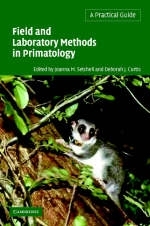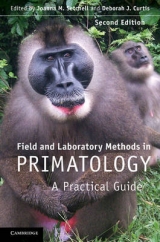
Field and Laboratory Methods in Primatology
Cambridge University Press (Verlag)
978-0-521-82004-2 (ISBN)
- Titel erscheint in neuer Auflage
- Artikel merken
Field and Laboratory Methods in Primatology is a manual for students and researchers studying wild primates. Technological advances allow fieldworkers to collect a wide range of data, store samples for later analysis, and collect information remotely. These methods open up opportunities to gain new insights on previously studied populations and are the means of collecting data on species that have, until now, been difficult to study. However, information on the practicalities of using such methodology in the field has largely been lacking. Here, in this indispensable reference, experienced fieldworkers provide the first comprehensive guide to the wide variety of techniques available for the study of wild primates. Covering everything from pre-trip planning to laboratory analysis of endocrine and genetic samples, packed full of tips and emphasising practicalities and ethics throughout, it is a must-have for all field primatologists and others studying free-ranging animals.
Joanna M. Setchell is a Post-doctoral Research Fellow at the University of Surrey Roehampton, and the Centre International de Recherches Médicales in Gabon. Deborah J. Curtis is a Post-doctoral Research Fellow at the University of Surrey Roehampton.
1. Human-nonhuman primate interactions: an ethnoprimatological approach Lisa Jones-Engel, Michael A. Schillaci and Gregory A. Engel; 2. Habituating primates: processes, techniques, variables and ethics Elizabeth A. Williamson and Anna T. C. Feistner; 3. Habitat description and phenology Jörg U. Ganzhorn; 4. The Global Positioning System, Geographical Information Systems and remote sensing Karel Hughes; 5. Monitoring local weather and climate Julian Mayes; 6. Survey and census methods: population distribution and density Caroline Ross and Nigel Reeve; 7. Trapping Clifford J. Jolly, Jane E. Phillips-Conroy and Alexandra E. Müller; 8. Handling, anaesthesia, health evaluation and biological sampling Marc Ancrenaz, Joanna M. Setchell and Deborah J. Curtis; 9. Morphology, morphometrics and taxonomy Colin Groves and Joanne Harding; 10. Marking and radio-tracking Paul E. Honess and David W. MacDonald; 11. Feeding ecology and seed dispersal J. Lawrence Dew; 12. Dietary analysis I: food physics Peter W. Lucas, Daniel Osorio, Nayuta Yamashita, Jonathan F. Prinz, Nathaniel J. Dominy and Brian W. Darvell; 13. Dietary analysis II: food chemistry Peter W. Lucas, Richard T. Corlett, Nathaniel J. Dominy, Hafejee C. Essackjee, Pablo Riba-Hernandez, Kathryn E. Stoner and Nayuta Yamashita; 14. Collecting arthropods and arthropod remains for primate studies Claire M. P. Ozanne and James R. Bell; 15. Tape-recording primate vocalisations Thomas Geissmann; 16. Photography and video for field researchers Noel Rowe and Marc Myers; 17. Chronological aspects of primate research Hans G. Erkert; 18. Thermoregulation and energetics Jutta Schmid; 19. Field endocrinology: monitoring hormonal changes in free-ranging primates J. Keith Hodges and Michael Heistermann; 20. Collection, storage and analysis of non-invasive genetic material in primate biology Benoît Goossens, Nicola Anthony, Kathryn Jeffery, Mireille Johnson-Bawe and Michael W. Bruford; 21. Tips from the bush: an A-Z of suggestions for successful fieldwork Simon K. Bearder, K. A. I. Nekaris, Deborah J. Curtis, J. Lawrence Dew, Julia N. Lloyd and Joanna M. Setchell.
| Erscheint lt. Verlag | 18.9.2003 |
|---|---|
| Zusatzinfo | 12 Tables, unspecified; 3 Halftones, unspecified; 23 Line drawings, unspecified |
| Verlagsort | Cambridge |
| Sprache | englisch |
| Maße | 159 x 237 mm |
| Gewicht | 740 g |
| Themenwelt | Geisteswissenschaften ► Psychologie ► Verhaltenstherapie |
| Naturwissenschaften ► Biologie ► Zoologie | |
| ISBN-10 | 0-521-82004-9 / 0521820049 |
| ISBN-13 | 978-0-521-82004-2 / 9780521820042 |
| Zustand | Neuware |
| Informationen gemäß Produktsicherheitsverordnung (GPSR) | |
| Haben Sie eine Frage zum Produkt? |
aus dem Bereich



